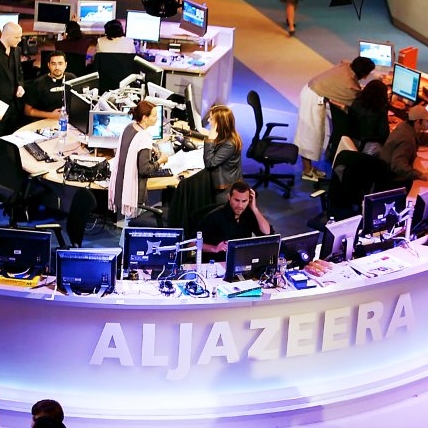click to dowload our latest edition
CLICK HERE TO SUBSCRIBE TO OUR NEWSLETTER


Published
7 years agoon
By
adminPAULA SLIER
It is ironic therefore that two decades on, it is now the Israeli government who is making moves to shut it down.
This week the country’s Communications Minister Ayoub Kara, who belongs to Prime Minister Benjamin Netanyahu’s Likud party, announced plans to close the Al Jazeera offices in Jerusalem, revoke the credentials of its journalists and continue to lobby cable providers to block transmissions.
Naturally Netanyahu welcomed the move. He has been threatening to close down Al Jazeera for months, accusing it of inciting violence against Israel, particularly in recent days over its coverage of the Temple Mount crisis.
But it is not clear whether they’ll succeed.
I’m often asked why Israel gets such bad press. It’s a complex question that requires a multifaceted answer, part of which is that the country’s democracy allows for a myriad opinions to be expressed.
Some of the most critical anti-Israel arguments originate within the Israeli media. Countries like Sudan and China clamp down on media plurality at source and so anti-government sentiments are less likely to surface in the first place.
It is this democracy that Israel should be most proud of. Israeli politicians often evoke the claim that the country is “the only democracy in the Middle East” – if so, then shutting down a major news network flies in the face of that.
The “Committee to Protect Journalists”, a non-profit organisation promoting press freedom globally, issued a statement warning that the shutting down of Al Jazeera would not bring stability to the Middle East but “put Israel firmly in the camp of some of the region’s worst enemies of press freedom”.
But the Israeli moves don’t come out of nowhere. Al Jazeera, which is funded by the Qatari government, has been targeted by Sunni Arab nations in a months-long political dispute over Doha’s politics and alleged support for extremists.
In recent months, Saudi Arabia and Jordan both shut down Al Jazeera bureaux and the network’s signal has been blocked in the United Arab Emirates, Saudi Arabia, Egypt and Bahrain.
In a press conference announcing Israel’s decision to act against the network, the Communications Minister said it was “delusional” that Arab states would ban Al Jazeera but Israel wouldn’t.
This, I would argue is a poor excuse. Egypt ranks 161 out of 180 on the World Press Freedom Index, an annual ranking published by the NGO “Reporters Without Borders” in its assessment of countries’ press freedom records. Saudi Arabia ranks 168 out of 180; the UAE 119. This is hardly illustrious company for Israel to share. Jerusalem currently ranks – although not excellent but still better – at 91.
There are those who argue that Israel is currying favour with the Sunni world, or at least taking advantage of the momentum building against Al Jazeera. But it’s a dangerous path to follow and will leave the country red-faced next time her leaders charge “the only democracy in the Middle East” argument.
The question whether this move is really about free independent media or rather about power politics in the region, becomes a legitimate one.
Communications Minister Kara accused the channel of inciting terrorism, which I would agree is a fair argument in the curtailment of freedom of speech and expression.
Israeli academics back up the charge, complaining that Al Jazeera has given a platform for groups like Al Qaeda and Hezbollah; and not least of all, the network’s funders support Hamas. But let’s not employ double standards. Saudi Arabia, who is leading the boycott against Qatar and who Prime Minister Benjamin Netanyahu has been cozying up to, is a huge sponsor of terror.
Of the 61 groups that the United States designates as terrorist organisations, the overwhelming majority are Saudi-funded. Netanyahu should not complain about the terror Al Jazeera purportedly gives a platform to, while turning a blind eye to that supported by Riyadh.
It’s also a fine line between inciting violence on the one hand and promoting freedom of thought on the other.
It can just as easily be argued that Al Jazeera provides a platform for a more pluralistic and democratic political discourse. Audiences are anyway exposed to inciteful arguments online – at least here context is given.
What’s more, instead of diminishing incitement by closing down the network, the actual act of shutting it down, points to aggression on Israel’s side.
Islamists are part of the general Arab society and by shutting them out, you don’t deny their existence. I recently attended a Unesco “Press Freedom” conference in Indonesia where a very telling comment was made by the editor of a local Indonesian television station: “Don’t over-estimate the power of the media to incite people to join terrorist organisations,” he said.
“Most people here are illiterate and that incitement comes from the mosques, not from the Internet or TV”.
Indonesia is the most populous Muslim country in the world – home to more than two million Muslims – and most of the population subscribe to moderate Islam.
To be fair, though, there are no Israeli media organisations based in Qatar and Al Jazeera can, and no doubt will, challenge the Israeli move in an Israeli court.
It is not so easy to revoke press credentials in Israel and the bodies in charge of doing so have given no indication they will comply. When it comes to talking about democracy, this is what the country should be most proud of.
Paula Slier is the Middle East Bureau Chief of RT, the founder and CEO of NewshoundMedia and the inaugural winner of the Europcar Woman in Leadership Award of the South African Absa Jewish Achievers.
